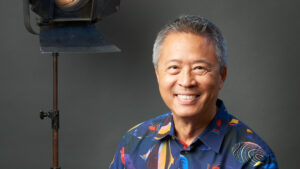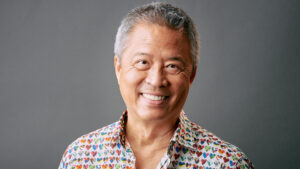
The return of Tim Dang to East West Players, where he served as Artistic Director for 23 years until retiring from the organization in 2016, was one born out of a new transition for East West Players: the appointment of his predecessor, Snehal Desai, as Artistic Director of Center Theatre Group.
“He had contacted me to find out if I was interested and available to take on this project. He was slated to actually direct this play,” said Dang in a recent conversation.” The play in question is Spring Awakening, the musical that won 8 Tony Awards for its original production in 2006 and whose 2015 revival was critically acclaimed (and in my opinion, a much better production). The East/West Players production of Spring Awakening officially opens this weekend where it will play through November 19th.
If you’d like to see the interview with Tim Dang, please go to our YouTube channel.
If you haven’t seen Spring Awakening, Duncan Sheik and Steven Sater’s musical is based on Frank Wedekind’s 1890 play that depicted teenagers in all their angst navigating self-doubt, sex, sexuality, suicide and the parents and teachers who fail miserably to be of comfort or use. It was those themes that interested Dang the most.
“It was a very intriguing idea in terms of how East West players could bring something different to Spring Awakening post-pandemic,” he revealed. “And with all the things that are happening in America that actually parallel the play which takes place in 1890 Germany.”
Dang elaborated the parallels which are shockingly still being addressed over 125 years later.
“When you talk about oppression and the power structures back in 1890 Germany, whether it was religion, the education system, the treatment of women, and then you draw parallels today where you still have oppression of religion, you have the overturning of Roe versus Wade, the banning of books, discrimination against the LGBT community… all of these themes are also very relevant today. If we are able as a company to really have robust dialog about some of these themes, I think we will have succeeded in what I think the creators of Spring Awakening originally intended with giving the youth rebellion that opportunity to change the world.”
To make sure that conversation was possible, Dang had to first determine the best way for it to start.
“With East West players being primarily an Asian-American theater, we are actually going through this concept of being very race specific in our casting as opposed to just being colorblind or being multicultural or diverse. We thought that was very important to bring to this production that would make it unique.”
But it wasn’t only race issues, but growing up through a worldwide pandemic that informs his cast and this production. Dang contrasted his own youthful period to the recent lives of many of his company members.

“I believe that all members of our cast are Gen Z,” he said. “They have gone through this period of isolation. They were attending college during COVID; attending classes by Zoom. Colleges were supposed to be the best years of their lives in terms of social interactivity and they did not have that. So when you talk about those themes of isolation and mental health, a lot of our cast members were very honest and forthcoming in terms of how traumatized they were during COVID. Not just because of fear of catching the virus or anything like that. But just in terms of their own mental health, in terms of being able to socialize and to network and to be with other people during this time where they thought they could be free.”
Given that Dang had different experiences of this time than his company, he realizes he has to rely a lot on what his cast has to say and not just be a director with a vision for them to follow. One area where that is of utmost importance is race.
“We talk more and more about intersectionality. In our company of 16 performers, nine of them – including our lead – are of mixed heritage. If you’re familiar with Spring Awakening, [we follow] Melchior’s journey through adolescence and coming of age. [Thomas Winter] is actually half-Japanese and half-white. Having cultural backgrounds in two worlds makes this character’s intersectionality a little bit more different than other productions of Spring Awakening. He doesn’t look Japanese enough or Asian enough to fit into auditioning for Asian roles or he doesn’t look white enough because he has Asian features. That’s a new intersectionality that this production deals with [that] weighs very big in terms of our production.”
Long before Dang was a director he appeared in a 1987 East West Players production of A Chorus Line in the role of Richie, a role described on various casting websites as African-American, basketball player, funny, enthusiastic. Surprised by the reference to a role he played 36 years ago, Dang spoke about how unique it was to have an all-Asian cast doing this wildly popular musical.

“As I recall back in 1987, we kept all the dialog the same. There were there was a little bit of confusion. There’s all these Asian people and there’s Richie, there’s Diana Morales. But after five or ten minutes, we just became those classic iconic characters of A Chorus Line and I think that was the goal.”
What was the goal in the late 1980s is a completely different practice in theater today. The end result for actors who get to take on roles originally written for other ethnicities is ownership and identity.
“Whether it is a performer of color or a person who is from the LGBT community, it is very important that when they embody a character, that they bring 100% of themselves to that character.”
Though great strides have been made since Dang was onstage singing “gimme the ball,” he’s not terribly optimistic that these conversations will one day be relics of a different time and place.
“I don’t think it’s going to go away. Identity just keeps on changing over and over and over again. There’s just so much to unpack in it. America really is this diverse place. I think [this] conversation is really important and that we actually keep on talking about it. Because the more that we talk about it and the more aware we are, I think the more we are accepting of our differences as well. That we can live together in a society where people accept and respect what everyone else is thinking.”
To watch the full interview with Tim Dang, please go here.
Main Photo: Mia Sempertegui, Thomas Winter and Marcus Phillips from Spring Awakening (Photo by TJ Ramirez/Courtesy East West Players)











